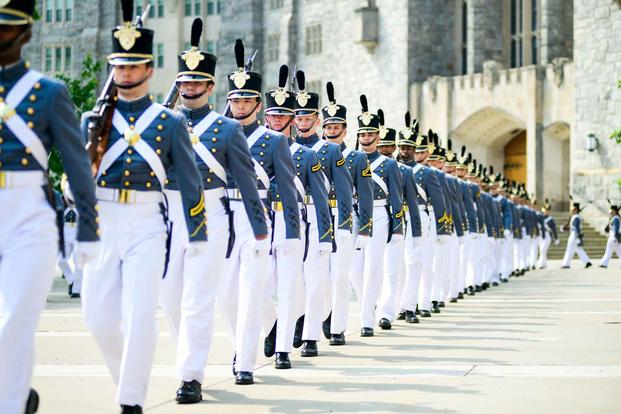
The Pentagon has finally published its long-awaited policy allowing cadets and Midshipmen to continue their education at the nation's service academies if they have children while enrolled, instead of having to leave school.
Under the prior policy, cadets who admitted to either procreating or giving birth to children were in violation of their service academy's rules, could have been kicked out, and might have been on the hook to pay back the cost of their education. Reforms to that policy were mandated in the National Defense Authorization Act passed in December 2021.
The Pentagon was given a year to implement the policy, but the formal guidance process dragged on nearly a year past the due date. Changes to the Department of Defense instruction were finally updated Nov. 1[1], according to the document.
Read Next: VA Pauses Foreclosures on Veterans Facing Difficulties Making Mortgage Payments[2]
The policy now officially recognizes temporary guardianship plans created by cadets and Midshipmen that direct who will care for their child while they finish their education -- a practice already put in place by the academies in lieu of Pentagon guidance. The child can't live at the service academy. Those who give birth will be granted anywhere from one year to two years of leave and will be temporarily waived from physical fitness requirements through pregnancy.
"A cadet or Midshipman who becomes pregnant may be granted a leave of absence for good cause by the [military service academy] superintendent," the updated Pentagon instruction reads. "In most cases, a one-year leave of absence will be sufficient. In unique circumstances, the MSA superintendent can grant a leave of absence not to exceed two years."
The child will be able to take advantage of Tricare[3] health coverage as well as other benefits like exchange and commissary[4] privileges, but cadets and Midshipmen will not "receive additional benefits, pay, or allowances as a result of their gaining a dependent until commissioned into active-duty service," according to the instruction[5].
As the Pentagon lagged on creating and implementing its guidance, Military.com reported last month[6] that service academies were honoring the spirit of the law in the meantime.
The Air Force Academy[7] was the first to adopt its own internal rules to honor the spirit of the CADET Act -- the original legislation that called for an updated policy -- and immediately assisted four of its cadets who had submitted family care plans to leadership. The plans detailed who would care for the child financially and physically while the cadets remained enrolled at the academy, the school told Military.com in March[8].
Neither the Coast Guard[9] Academy nor the Merchant Marine Academy are controlled by the Department of Defense instruction. The law passed as part of the 2022 National Defense Authorization Act, or NDAA, pertains to the Air Force, Army[10] and Navy[11] academies.
The Coast Guard Academy public affairs office told Military.com in an email last month[12] that it is also "following the spirit of the CADET Act while awaiting promulgation of a formal policy."
The original CADET Act legislation was introduced by Sen. Ted Cruz, R-Texas, and Sen. Kirsten Gillibrand, D-N.Y.
Bethany Stevens, a spokesman for Cruz's office, told Military.com on Monday that the guidance was "long-overdue" and gives cadets and Midshipmen the opportunity to continue their service.
"Students at our military academies should never have had to choose between keeping their children and serving our country, and our country should never have been losing them as service members," Stevens said. "It's deeply heartening that Congress, the Defense Department, and the academies were able to get this done."
-- Thomas Novelly can be reached at
This email address is being protected from spambots. You need JavaScript enabled to view it. [13]. Follow him on Twitter @TomNovelly.Related: Service Academies Honor Law Allowing Cadets to Have Kids Even as Pentagon Policy Lags[14]
© Copyright 2023 Military.com. All rights reserved. This article may not be republished, rebroadcast, rewritten or otherwise distributed without written permission. To reprint or license this article or any content from Military.com, please submit your request here[15].